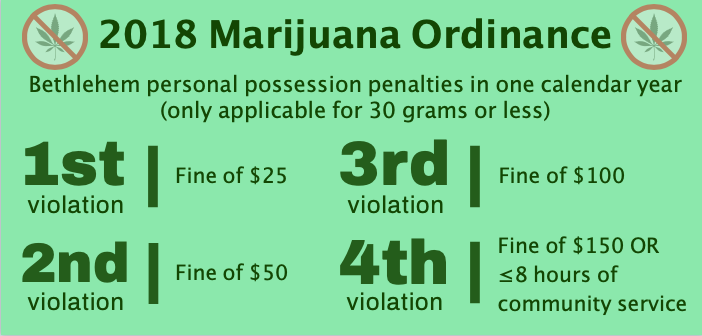Allegations of racial insensitivity. An investigation into the Bethlehem Police Department. Statements from a magistrate judge that she can’t adjudicate marijuana cases fairly. Demands from city council for data and answers.
These are the circumstances circling Bethlehem’s attempts to decriminalize marijuana.
With the city’s split between Lehigh and Northampton counties, and the disagreement between the two district attorneys on the legality of decriminalization, the city ordinance unanimously passed June 2018 has become the center of the marijuana decriminalization debate.
The decriminalization ordinance allows city officers to use their discretion when charging an individual in possession of 30 grams or less of marijuana. The officer can either apply the city ordinance, which acts as a summary offense, does not go on the individual’s record and requires the offender to pay a fine. Or, the officer can enforce the state misdemeanor charge, especially if other crimes are occurring in addition to the marijuana possession.
The misdemeanor is a harsher penalty that goes on the offender’s record and could mean prison time in Pennsylvania. With the Northampton County DA choosing not to intervene in the city law, and Lehigh County DA Jim Martin choosing not to honor the Bethlehem ordinance as valid, individuals possessing a small amount of marijuana could face vastly different consequences for the same crime depending on where they are within the city.
But the tension surrounding Bethlehem’s tenuous decriminalization ordinance has been unusually high in recent months — even despite the city’s distinct position straddling two counties.
The friction is partially based on a September 2019 traffic stop of a male Bethlehem resident.
Angelo Cabani was stopped by two Bethlehem police officers near the intersection of Hayes and East Sixth streets in South Bethlehem. Officers conducted a search of his 2001 silver Toyota and found two blunts and a small amount of marijuana.
Six months later, the issue is still being discussed and debated by city officials, including Mayor Robert Donchez — and allegations of racial insensitivity have been levied against the BPD.
Cabani is an American citizen who moved from Puerto Rico five years ago with his wife and three sons. He said he was driving down East Fourth Street toward Wind Creek Casino on Sept. 11, when he noticed a police car behind him as he passed the Subway by New Street. He turned onto Hayes Street to see if the officers continued to follow him.
When they did, he said he pulled over to let the cops pass. Instead, the officers asked him why he stopped, Cabani said, and he proceeded to demonstrate his driver’s license and Social Security card when asked. The officers then told Cabani he was linked to a warrant for a deported felon — an illegal immigrant — and proceeded to handcuff him, search his vehicle and transport him to the police station, where he was fingerprinted and identified.
“(The officer) was aggressive and rough with me,” Cabani said. “I was thinking of my son, I was thinking of my wife… I’ve never had any situation with any police officer, never been in any trouble here. It was a very bad experience.”
Cabani doesn’t dispute that he was in possession of marijuana at the time of his arrest.
When officers determined at the police station that Cabani was not the wanted felon, Cabani said the officers “joked” about not driving him back to his car on the South Side — about 1.5 miles away — but eventually did so. He said the officers never gave him a reason for being pulled over and never sought consent to search his vehicle. Cabani was eventually given a summons for the marijuana possession charge, costing him about $575.
But, in an affidavit of probable cause, the arresting officer wrote that he did inform Cabani that he was pulling him over for rolling through a stop sign at the intersection of Hayes and East Sixth streets and that he “conducted a consent search” of the car.
“Now, when I see a police car, and I’m driving, I get nervous,” Cabani said. “I think that they’re going to do that again. You don’t know what they’re going to do. I know there are a lot of good officers, most of them are not bad people, but there’s a couple of them that don’t like Hispanic people.”
Cabani was scheduled to appear before Magistrate District Judge Nicholas Englesson, whose Bethlehem district covers about half of the South Side and one-fifth of the city. When Cabani, who accepted his fine, relayed his account of what had occurred to Englesson, the judge decided on Nov. 14 to have a conversation with the two officers involved in Cabani’s arrest.
The officers, who reported the conversation to Bethlehem Police Chief Mark DiLuzio, claimed that Englesson said things like, “Not everyone who speaks Spanish is an illegal immigrant,” “I don’t want you hassling citizens because they speak Spanish,” and “You can’t arrest someone just because they are Spanish-speaking.”
DiLuzio, supported by the two officers’ written recount of the conversation with Englesson, informed Court Administrator J. Jermaine Greene of Englesson’s “baseless and inappropriate” comments in a Nov. 20 letter obtained by The Brown and White.
“The officers handled this case as we would with any individual (whose) name was alerted on a possible warrant,” DiLuzio and Deputy Police Chief Scott Meixell wrote in the letter to Greene. “Englesson should understand that officers have a duty to verify the validity of a warrant and to properly identify the individual in custody.”
The Brown and White attempted to obtain the documents through a right to know request. After the city extended the response deadline to 30 days, a city records employee told The Brown and White that the request would likely be denied at the conclusion of the 30 days due to the sensitive nature of the documents. The documents were verified through a source close to the matter.
DiLuzio did not respond to a request for comment.
Englesson responds to complaint filed against him
BPD officially filed a complaint against Englesson on Nov. 26 for accusing an “unnamed officer of being a racist” and for shouting at the officer. While Englesson said the majority of the officers’ report is true and admitted the conversation was “difficult” with the officers, he said he never used the word “hassled,” never raised his voice and never accused anyone of “being a racist.”
Englesson said while the officer reported that the search of Cabani’s vehicle was with consent, the officer never listed the reasoning, based on probable cause, for requesting such a search.
“It was difficult because I had to walk a fine line between having the officer think he had done something wrong on one hand… On the other hand, because even if the officer was not guilty of profiling…, a perception in the community that Hispanic Americans were being profiled by the police could lead to citizen resentment of the police, failure of citizens to trust the police… as well as potential lawsuits against the city for civil rights violations,” Englesson wrote in his Nov. 29 response to the complaint lodged against him.
Englesson wrote though he has the “utmost respect” for Bethlehem’s police force, officers “need to be aware of the potentially intimidating nature of a stop, particularly when the detainee is an uneducated, powerless individual with a poor command of the English language.”
He said he was “shocked” to learn of the complaint and wished that DiLuzio had the “decency” to speak with Englesson personally regarding the matter, just as Englesson did so “informally and amicably” with the Bethlehem officers.
Englesson files a complaint of his own, and Donchez responds
In a letter copied to the clerk of the city council, Englesson wrote to Donchez on Dec. 20 to file a complaint against DiLuzio and the unnamed officer involved in the arrest, whose name was redacted in the documents.
Englesson claimed that while he cannot say whether the officer engaged in racial profiling or ethnic intimidation, he found the officers’ conduct to exert “unnecessary force, rudeness and intimidation” against Cabani.
Englesson concluded his letter by stating that “in the past week,” he has observed another incident, in which a Hispanic individual claimed to be harassed by police and requested the officer in question be removed from his district, referring to him as “a threat to my constituents.”
“I am putting the city on notice that the behavior of this officer, and the chief of police, is in danger of exposing the city to civil unrest among the Latino population,” Englesson wrote.
The Brown and White reached out to every city council member for comment. Michael Colón and Olga Negrón were the only members who agreed to be interviewed. Colón, the chair of the public safety committee, said he has “full faith” in how BPD conducts itself and “would hope that the police department was being equal in how they treat offenders.”
“Nobody has called or emailed me that they have been unjustly dealt with by the police department,” Colón said.
Negrón, who is recently married to Englesson, said she “keeps hearing” from mostly Hispanic neighbors and community members who claim the police regularly conduct vehicular searches without consent or probable cause. She said she believes DiLuzio isn’t enforcing the city ordinance for political reasons.
“I have been screamed at by Bethlehem police officers, and I have complained directly to the chief and to the mayor,” she said. “You know what they say? ‘Did you show them your city council ID?’ And I’m like, ‘Really? That’s what I need to do?’ This is not about who I am as a political person — it’s a human being. Period.”
Donchez addressed the situation at the Feb. 18 city council meeting.
“The allegations have been subject to a thorough internal investigation,” Donchez said. “This included review of dash camera and body camera: audio/video evidence of the actual events. The evidence shows that the allegations are false… For the foreseeable future, further comment on this matter will be very limited or declined.”
Englesson, in his November letter to Greene, speculated of “only one reason” why DiLuzio is “attacking” him. Englesson recounted an encounter at a local NAACP award dinner, in which he and Negrón, and Mark DiLuzio and his wife, Nuria, were in attendance and sitting at the same table. Nuria DiLuzio informed Englesson that she was running for Northampton County DA in the Democratic primary, following John Morganelli’s decision to run for a county judgeship.
According to Englesson’s letter, he respectfully told her that as a judge, he could not take sides in the race. However, when Negrón publicly backed her opponent and eventual winner, Terry Houck, Englesson said he was put in “a somewhat awkward position.”
“While I would not like to think that this baseless accusation lodged against me… has political underpinnings, I am unable to ignore this possibility, since I see no other reasonable explanation for the chief’s actions,” Englesson wrote.
Another judge speaks out on marijuana in Bethlehem
Nancy Matos Gonzalez, the other magistrate district judge in South Bethlehem, voiced her concerns that BPD and LUPD are so far apart in their policy practices for individuals prosecuted for a small amount of marijuana that it “constricts my ability to dispense equitable justice.”
The Dec. 10 letter, addressed to DiLuzio, also copies the DA, Donchez and Lehigh Police Chief Jason Schiffer. Gonzalez said she will not be “complicit” in this systemic issue, in which Lehigh students are far more likely to be issued a summary offense than a city resident on city streets.
“I ask how that can be justified,” she wrote. “I will not ignore that the demographics between both communities are unarguably vastly differing based on race, ethnicity and economic levels.”
She said, as of Sept. 26, 2019, BPD has prosecuted cases of possession of a small amount of marijuana with the criminal charge at a rate of three and a quarter times more often than the summary ordinance in her district. Individuals charged with the criminal offense are subject to pay fines up to five times the amount for the summary offense and has the potential for a permanent record, Gonzalez said.
Schiffer said the vast majority of marijuana offenses by Lehigh students are handled through the Office of Student Conduct. Of those offenses that LUPD officers deemed necessary to apply the law, officers charged four students in 2019 through the city ordinance and just one with the state misdemeanor charge.
“I believe that we are trying to do the best we can when dealing with anyone, student or non-student, in possession of marijuana,” Schiffer said. “The city ordinance of decriminalizing gives us one more option to use, and we have used that on numerous occasions… I think we try to use our discretion as best as possible based on the totality of the circumstances.”
Schiffer said he hopes Gonzalez’s concerns will be addressed through the leadership of BPD and the DA’s office.
Negrón suggested that one way for DiLuzio to bridge the divide among marijuana cases in Bethlehem is for him to instruct his officers to apply the city ordinance in the Lehigh County portion of the city, despite threats from Martin that he will only honor the state misdemeanor charge.
About 55,000 of Bethlehem’s 75,000 residents live in the Northampton County section of Bethlehem.
DiLuzio, in a previous Brown and White interview, was quick to shoot down the “irresponsible” idea, warning Negrón not to use the police to resolve debates among politicians.
Colón admitted the ordinance isn’t an easy one for BPD to enforce.
“We didn’t do the police department any favors,” Colón said.
Still, Negrón has “no regrets” over her sponsorship of the decriminalization bill, despite knowing the challenges it would present officers with Lehigh’s and Northampton County DA’s disagreeing on enforcement. She said she copied the language of the ordinance from Philadelphia’s city decriminalization law.
“The city ordinance — even though it’s just a small step — officers can really use it to the betterment of their constituents,” Negrón said. “They have that power. I see it as an opportunity.”
City council members and residents will be able to view DiLuzio’s presentation of data on March 3, relating to the city’s decriminalization efforts.
This report was compiled by The Brown and White’s Investigative Team.






Comment policy
Comments posted to The Brown and White website are reviewed by a moderator before being approved. Incendiary speech or harassing language, including comments targeted at individuals, may be deemed unacceptable and not published. Spam and other soliciting will also be declined.
The Brown and White also reserves the right to not publish entirely anonymous comments.
1 Comment
Pingback: Bethlehem Chief proposes marijuana solution – Two Stoned Birds